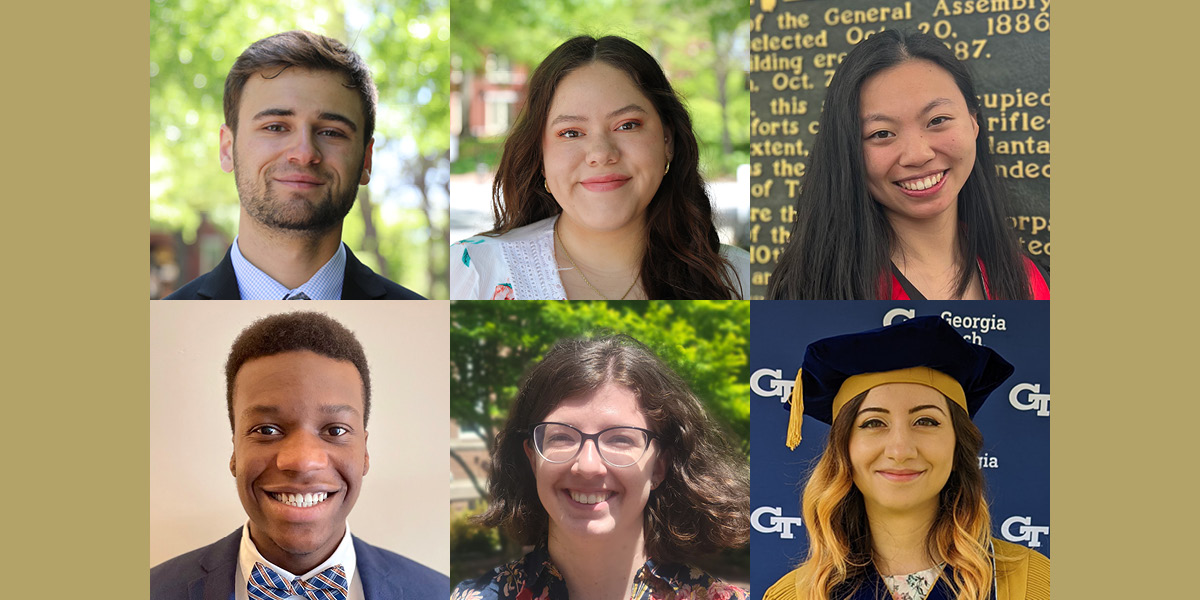
Luke Marino, BSAE 2022
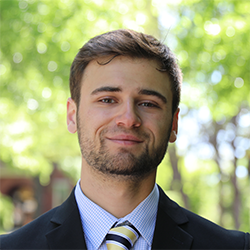 |
| Luke Marino |
What is your next adventure?
I’m going to be interning at SpaceX this summer. It'll be my third time at SpaceX. I've interned there the past two summers as well, most recently being on the Raptor engine systems team. I'll be going back this summer and joining the same team again.
After my internship, I'm going to start grad school at Georgia Tech as a part of the AE School BS/MS honors program. I'll be doing research under Dr. Mitchell Walker in the High-Power Electric Propulsion Lab (HPEPL) where I've been researching since I was a sophomore.
What about your next adventure are you most looking forward to?
For my internship at SpaceX, I'm really looking forward to getting a new project and just learning more about engines. This past summer I didn’t fully understand pogo instability, structural dynamics or anything beyond what I learned in AE 3530 (System Dynamics and Vibration), and then my entire project was using material from AE 3530, it was really cool to apply what I learned and get hands-on experience so I’m looking forward to more of that.
I’m also really looking forward to firing my first Hall-effect booster. I've supported a lot of grad students through my time as an undergrad researcher, but I haven't gotten to truly own a project. I’m co-owning one right now, but it'll be great to have sole ownership of a project as a grad student and fire a Hall-effect thruster. The HPEPL has a great lab culture so I'm just looking forward to hanging out with the grad students and continuing to work together.
Did you have any previous co-op, internship, or research experience in this area?
During my sophomore year I interned with SpaceX for the first time as a vehicle engineering intern. I was working on a mockup of the Dragon propulsion system where I could plug-in faulty components to see how that would affect the rest of the system. On my second day of work we watched Demo-2 launch and during my second to last week they returned so it was a really great experience interning there during that time.
During my third year I interned with Northrop Grumman as an electric propulsion intern where I used thermal physics framework to predict sputter yield analysis to evaluate erosion of metal material typically found on spacecraft. I later interned with SpaceX again as a propulsion intern working on the Raptor engine team where I worked on cavitation compliance to mitigate pogo instability risk. As a member on the engine systems team, we oversaw all of the engine qualification testing down to determine the instability and risk of the rocket.
How did your educational experience at Georgia Tech help you to achieve your goals?
My connections with Dr. Walker and the High-Power Electric Propulsion Lab really helped me reach my goals. Tech has a really great electric propulsion lab and it's one of the main reasons why I applied here. The machine shop is great too. I know not all universities have a machine shop with as experienced machinists that we have or may not have the large machines like we do so it’s a great asset that students have access to. Learning how to design and work with the machines has not only helped me as a student, but it has allowed me to design and manufacture parts at my internships with SpaceX and Northrop Grumman.
What advice would you give to an underclassman who would like to follow the same path?
Get involved early because in my opinion experience is like compound interest. The earlier you get started, the greater the exponential benefits you can get later down the line. I was able to get a lot of machine experience by getting into the machine shop early in my freshman and sophomore years. Then, I was able to leverage machining experience into more important roles down the line by having the ability to go out and manufacture parts for the lab and in my internships. I was able to get more interesting projects, which I was able to learn more and therefore become an even better and more capable engineer. That machine experience is incredibly useful as an undergrad.
Take classes outside of what's required for your major. I'm about halfway through a Computer Science Minor just from taking computer science classes. I've been able to learn Java by taking CS:1331 and I've taken some numerical methods classes and learned Python which has all been incredibly useful in my internships. While at SpaceX I was able to develop an engine performance analysis tool. There’s a lot that you can learn outside of your major that can still benefit you.
Brenda Valdez, BSAE 2022
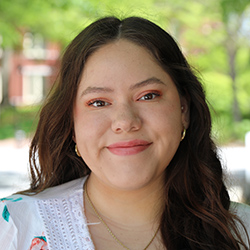 |
| Brenda Valdez |
What is your next adventure?
I’ve been fortunate enough to obtain the GEM Fellowship which pairs members of underrepresented groups with paid internships and full tuition at science and engineering universities. So, I’ll be interning at SpaceX as an associate engineer this summer and again next summer, and this fall I will begin graduate school at Purdue University.
What about your next adventure are you most looking forward to?
I’m mostly excited to start a new chapter of my life. I love Georgia Tech and have spent the last four years here, but I’m also looking forward to starting a new chapter as a graduate student in a new city. I’ll be working with Dr. Timothée Pourpoint, focusing on green hypergolic fuels and testing them in various systems.
I'm excited to learn a lot about chemical in space propulsion, and to see how that area compares to electric in space propulsion, which is the area I’ve been working in the High-Power Electric Propulsion Lab (HPEPL) with Dr. Mitchell Walker for the past two years. And really finding my niche is what I'm most excited about.
Did you have any previous co-op, internship, or research experience in this area?
I’ve had three internship experiences during my time at Tech. My first internship was after my sophomore year when I interned at GE Aviation as a technical engineering intern. During my junior year I interned with Carbice Corporation working in experimental test setups and pressure testing. They specialize in carbon fiber nanotube technology which is used in different electrical and engineering applications.
Last summer I interned with Blue Origin at Cape Canaveral, Florida. I was a fluid system engineering intern where I was part of the Test and Flight Operations Group. My day-to-day consisted of design analysis testing and data reduction of the overall project results. I built a fluid panel to do verification testing of gaseous helium and gaseous nitrogen systems.
How did your educational experience at Georgia Tech help you to achieve your goals?
The classes at Georgia Tech did a really good job of giving me a very fundamental understanding of whatever subject I was learning and from that it helped me gauge my interests. The extracurricular opportunities and student groups here really helped me obtain internships and also gain practical knowledge. I served as the structures lead in the Georgia Tech Experimental Rocketry Club (GT-XR) and it really validated my interest and pursuit of studying rockets. It also gave me a lot of practical knowledge of things an engineer should know to be successful in an internship or graduate school, but also how to machine certain parts and the importance of manufacturing. It also taught me how to better work as a team, take direction, and hone more engineering skills.
What advice would you give to an underclassman who would like to follow the same path?
Don’t be afraid of uncertainties or not knowing everything. I feel like at Georgia Tech, sometimes you look around, and everyone just seems to know what's going on or what they want to do. So don't let that kind of thing hold you back. I think one thing that I really benefited from was poking my nose in places even though I had no idea what was going on. Opening yourself up to experiences or clubs or groups that you just may not know anything about could accidentally lead you into something that you really love.
Don’t be afraid to reach out and ask for help or guidance. I feel like Georgia Tech has done a good job of providing support, whether it be the student body or advisors or professors there’s a lot of support here. I never felt bad because I didn't know something or needed to ask for help. I think having that mindset is important for new students especially.
Stacey Tian, BSAE 2022
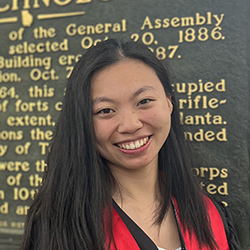 |
| Stacey Tian |
What is your next adventure?
After graduation I will be going to Chicago and starting a full-time job at the Chicago Trading Company as a quantitative trading analyst. It's a shift from aerospace, but I really enjoy math and playing around with math problems and numbers, so I'm looking forward to starting there later this year.
What about your next adventure are you most looking forward to?
I'm looking forward to doing something new. I've been studying aerospace for the past four years, so it will be a bit of a change going from being a full-time engineering student to working in a new city, new industry, and new company so it's all really exciting for me.
Did you have any previous co-op, internship, or research experience in this area?
I interned with the Chicago Trading Company last summer as a quantitative trading analyst intern and that's how I found that I really wanted to keep pursing this type of work after graduation.
I did undergraduate research my freshman and sophomore year in the Aerospace Systems Design Lab (ASDL) and last semester I did research with Dr. John Dec. During my first semester with ASDL I worked on model-based systems engineering (MBSE) and my second semester I used Dassault Systems 3D to model an aircraft wing using their platform, which integrates various software and provides solutions and visualizations. My research with Dr. Dec looked into the viability of aero capture for orbital insertion around Titan, so we would utilize aerodynamic drag to slow down a vehicle's speed into a more optimal speed.
How did your educational experience at Georgia Tech help you to achieve your goals?
The courses in aerospace are so varied that you inevitably have to learn things that maybe don't click straight away or maybe it's a subject you aren't particularly interested in, but as an engineer you learn the discipline of pushing through and getting to the end goal which I found really valuable to reach my own.
Professor P.K. Yeung has been instrumental in my time here at Tech. I really enjoyed how he taught aerodynamics and the mathematical rigor that he expected of his students. Through that rigor and mentorship, he helped me take AE classes that were statistics-based which actually overlaps well when understanding turbulence as well as the stock market.
What advice would you give to an underclassman who would like to follow the same path?
Go with the flow and try not to stress over what's coming next. At the end of the day, what you're learning will be applicable in many fields and in many areas of life, so you don't have to worry if this is the exact direction for you. You can adapt and work with the resources around you to figure out where you should go next.
Carlota Bonnet, MSAE 2022
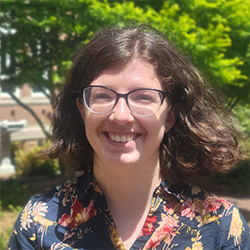 |
| Carlota Bonnet |
What is your next adventure?
I will be staying at Georgia Tech to continue on to my Ph.D. in aerospace engineering.
What about your next adventure are you most looking forward to?
I'm done with taking classes so now I can fully focus on my research and working on my thesis. Before, I was splitting up my weeks between research and classes which can be really hard at times, so I'm looking forward to having more time to research which investigates wind gusts in urban environments and applies it vertical lift vehicles especially small ones, like drones.
Did you have any previous co-op, internship, or research experience in this area?
As an undergrad student, I did research with Prof. Lakshmi Sankar, looking at the computational fluid dynamics (CFD) of an airfoil and investigating the effects of different angles of attack. It was enough to introduce me to CFD which I really liked so I decided I would study it in graduate school. During graduate school I started doing research in the Vertical Lift Research Center of Excellence (VLRCOE) with Prof. Marilyn Smith.
How did your educational experience at Georgia Tech help you to achieve your goals?
As an undergrad I knew I wanted to study helicopters, which Georgia Tech has one of the biggest research centers for helicopters and rotorcraft, the VLRCOE. Dr. Smith and Dr. Sankar helped me figure out which area I wanted to study and when I became a master's student I knew I wanted to do CFD. Throughout my time as a master's student I've been able to work on the same project with the VLRCOE which is really rare in that I've worked on it from the start of the project and so I'm able to use all the research and discovery up into this point and I'll continue to pursue it as I work on my thesis as a Ph.D. student.
What advice would you give to an underclassman who would like to follow the same path?
If you're in a school that has research, especially research in areas that interest you, make sure you ask professors about their research. Don't be afraid to ask because they can help answer your questions and possibly see if they have a spot for you in their lab. The professors at Tech are always helpful and so are the grad students. We've been in your shoes - just a few years ago - so we understand not knowing what to do or how to move forward and we will do our best to help.
Abraham Atte, MSAE 2022
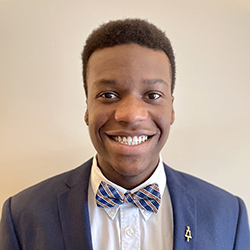 |
|
Abraham Atte |
What is your next adventure?
I want to go into academia and teaching, so I'm staying at Georgia Tech to pursue my Ph.D. in aerospace engineering.
What about your next adventure are you most looking forward to?
As a master’s student I worked with Dr. Juergen Rauleder in the area of experimental rotorcraft aerodynamics, so I’m excited about continuing my research. I've been challenged in a lot of ways that I didn't even know were possible, so I'm looking forward to really diving deep into the research and figuring out the reasons for some of the results that I'm seeing. Now that I'm finished with my coursework I can focus purely on the research which is really exciting.
Did you have any previous co-op, internship, or research experience in this area?
As an undergraduate student I interned with the National Space Research and Development Agency in Nigeria, where I'm from, as a propulsion systems intern. I designed attitude control thrusters for a communication satellite that Nigeria was sending up to space. It was a really awesome experience to see the real-world flow in industry and being a part of the design process and what decisions need to be made. I was really excited to have that experience under my belt and it helped me figure out what specific research I wanted to study in graduate school.
How did your educational experience at Georgia Tech help you to achieve your goals?
Classes at Georgia Tech have been challenging, but they are challenging in a way that really facilitated my growth. Coming into Tech I didn't know that I wanted to study rotorcraft specifically, I knew I wanted to understand general aerodynamics, but as I started tapping into all of the resources here I found my way into rotorcraft aerodynamics which has been awesome. All of my aerodynamic courses have prepared me for my research and the funding at Tech has made my research experience that much more possible.
What advice would you give to an underclassman who would like to follow the same path?
Don't be afraid to ask questions. I know sometimes it can seem a little daunting what the graduate school application process is like, but the people around you here are really there to help you. Don't be afraid to tap into those resources with graduate students, professors, or advisors in the AE School.
Remember, it is a process. It can seem really scary trying to look five years ahead - I know that was the case for me - but remember the grad students around you as well as your professors and advisors have all gone through the exact same thing that you are going through and went through the same process, so be patient and remember it's a process to get to where you want to be.
Ruxandra Duca, PhDAE 2022
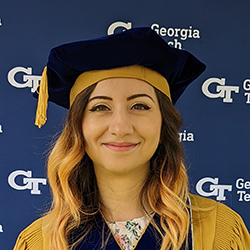 |
| Ruxandra Duca |
What is your next adventure?
In June I will start my first full-time job as a systems engineer for Wisk Arrow. They are a company located in Mountain View, California that specialize in small, electrical aircraft that can take off and land vertically which alleviates urban congestion, traffic, and reduce emissions.
What about your next adventure are you most looking forward to?
I’ve learned design methods and systems engineering methods during my time at Georgia Tech, so I'm excited to apply them in this field of electric vertical take-off and landing (eVTOL). It’s kind of new to me, I'm definitely excited about the field, but I haven't worked with it extensively. I think urban air mobility and electrical small aircraft are some of the next big things to take off in the industry, so it’s definitely an exciting time to start working at Wisk Arrow.
Did you have any previous co-op, internship, or research experience in this area?
As part of my research, I have worked a lot with methods for model-based systems engineering (MBSE), which I will be doing primarily in my new role. As a grad student, I spent five years on a project with Airbus on model-based systems engineering where we looked at the industrial challenges that they had in terms of their aircraft design process and their current models to provide methods to more systematically explore new aircraft architectures without introducing any errors. Through that experience I also pursued a master’s in computation science and engineering (CSE) and carried over some methods into my thesis, so it was a nice area for exploration.
How did your educational experience at Georgia Tech help you to achieve your goals?
I think we have a really interesting program specifically in the Aerospace Systems Design Lab (ASDL), where we do a lot of work and collaboration with industry. I mentioned Airbus earlier, but I've also worked with Gulfstream during my first couple of years here. We really collaborate with their engineers, we get to see the kinds of challenges that they have in the industry and in the company, the kinds of questions they ask, so it really helped me learn a lot more than just through pure academic research and going to classes.
Professor Dimitri Mavris and my coursework really opened my eyes to how aircraft design could be improved. In the ASDL we focus on system design engineering, which includes all of the disciplines within the aircraft, so I've learned a little bit in each discipline area and from there I chose to study MBSE, which brings together the bigger picture and how everything integrates together.
What advice would you give to an underclassman who would like to follow the same path?
Use the first couple of years to really explore all the options, especially in aerospace, there are so many disciplines and so many different aspects you could focus on. Once you find something that you like, really pursue it, go to presentations, look things up. Classes are important, but also collaborating openly with companies as much as you can through research and projects is extremely helpful. Asking a lot of questions, and not being afraid of speaking up in presentations are so important too.
For undergrad students: find a lab that you’re interested in and see if you can work for them and if you like the work. There’s a lot of undergrad research opportunities available to you.
Have a plan. Especially if you want to pursue a Ph.D, you will have to create your own milestones and deadlines. You can get sidetracked very easily or slowed down, so keep the end goal in mind and have clear deliverables that you set for yourself.